Plenary speakers
Plenary speakers

Professor Jan G. Bjaalie is a Dean for Research and Innovation at the Faculty of Medicine at the University of Oslo. He is internationally recognized for his contributions to neuroinformatics, brain architecture, and map transformations in sensory systems of the brain.
His research focuses on ontologies to cyberinfrastructure for data management and the practical implementation of data sharing and reuse.
Professor Bjaalie has played a central role in major European neuroscience initiatives, including the EU Human Brain Project, where he served as Leader of the Neuroinformatics Platform and Director of Infrastructure. He is also a founding Chief Editor of Frontiers in Neuroinformatics and serves on the Management Board of EBRAINS AISBL.
Through leadership roles in the International Neuroinformatics Coordinating Facility and the International Brain Initiative, he has been actively involved in shaping global neuroinformatics policy. Through his work, he promotes the development of data standards, open-access platforms, and international collaboration in neuroscience research.

Józef Dulak, PhD, DSc, is the professor and head of the Department of Medical Biotechnology at the Faculty of Biochemistry, Biophysics and Biotechnology of the Jagiellonian University in Kraków, Poland. He is elected member of the Polish Academy of Arts and Sciences and member of Academia Europaea. Currently he is the vice-chairman of the Committee of Biotechnology of the Polish Academy of Sciences. He worked as post-doctoral fellow at Free University in Amsterdam (1991), University in Muenster (1994) and Stanford University (1997), and was the research fellow at the University of Innsbruck (1999-2001). He is the doctor honoris causa of the University of Orleans in France (2012), received the “Dr. Luis Federico Leloir” Award from the Argentinian Ministry of Science and Technology (2014), and has been invited to lecture at numerous international conferences and foreign institutions, including the visiting professorship from the Japanese Society for the Promotion of Science (2010) and at the University of Orleans (2009, 2013). From 2013 to 2020 he was the coordinator of the International Associated Laboratory (LIA) of the Jagiellonian University and CBM CNRS in Orleans, he was the president of the European Vascular Biology Organization (EVBO) – 2013-2017.
He conducts research on molecular mechanisms of cardiovascular diseases and genetic neuromuscular diseases, including the function of stem cells and the possibilities of genetic and cell therapies. He is the co-author of more than 280 papers (h-index is 56), and is the co-inventor of one patent. Prof. Dulak coordinated numerous grants (more than 13,5 million Euro in the last 10 years), both research and infrastructural.

Professor Steve Williams is a globally recognized expert in neuroimaging and the Founder, Director, and Head of the Centre for Neuroimaging Sciences at the Institute of Psychiatry and Maudsley Hospital, King’s College London. He currently leads both the Department of Neuroimaging and the Centre for Neuroimaging Sciences at the South London and Maudsley NHS Foundation Trust.
Prof. Williams began his academic journey at Loughborough University, graduating in 1985 before spending a formative year at Beecham Pharmaceuticals in Harlow, where he worked on high-resolution NMR spectroscopy. His passion for imaging led him to pursue doctoral studies, and in 1988, he was awarded the first-ever PhD in Magnetic Resonance Imaging by the University of Cambridge.
Following his doctorate, he established the University of London Intercollegiate Imaging Facility at Queen Mary College, focusing on the development and application of magnetic resonance techniques across diverse preclinical models of disease. In 1994, he joined the Institute of Psychiatry to champion the clinical application of neuroimaging in central nervous system (CNS) disorders.
His research group is dedicated to the innovation and clinical translation of neuroimaging methods—ranging from brain structure and function to metabolism and physiology. These non-invasive, patient-friendly techniques have the potential to revolutionize diagnostics and therapeutic monitoring in neurology and psychiatry. His current work includes the development of a dedicated head-only MRI scanner and quiet, rapid imaging protocols to support the care of vulnerable patient populations.
Prof. Williams has co-authored over 400 publications and book chapters in leading neuroscience journals. His scientific impact includes numerous pioneering achievements such as an Automated MRI-based classification of autism with over 90% accuracy, the development of robust, harmonized MRI protocols for multicentre trials, groundbreaking fMRI studies on depression and pharmacological response, novel applications of diffusion imaging in motor neuron disease, translational pharmacological imaging of neurotransmitters like dopamine and glutamate.
He has received numerous distinctions, including the Pfizer Young British Scientist of the Year, the GE Healthcare Thought Leader of the Year, and the NHS Innovation of the Year Award. His commitment to translational neuroscience aligns with the United Nations Sustainable Development Goals, especially in the areas of health innovation and mental well-being.

Professor Andrzej Lewenstam is an internationally recognized chemist specializing in electroanalytical chemistry, chemical sensors, and biomimetic materials. He holds full professorships at Åbo Akademi University in Turku, Finland, and at the AGH University of Science and Technology in Kraków, Poland. Since 1990, he has served as Director of the Centre for Process Analytical Chemistry and Sensor Technology (ProSens) at Åbo Akademi, a pioneering center bridging academia and industry in the field of sensor science.
Born in Poznań, Poland, in 1949, he graduated with distinction from the Faculty of Chemistry, University of Warsaw in 1972, where he also earned his PhD in 1977 and DSc (habilitation) in 1986. He began his academic career at the University of Warsaw, working at both the Faculties of Chemistry and Philosophy.
From 1985 to 1997, he held leadership positions in industry, including as R&D manager and principal advisor at KONE Instruments (Finland) and Thermo Fisher Scientific (USA). He has conducted international research stays at Université Laval (Canada), the University of North Carolina (USA), and George Mason University (USA). Since 2004, he has also held a professorship at Université Laval.
Professor Lewenstam is the author of approximately 500 scientific publications and holds 10 patents. He has supervised numerous doctoral dissertations and actively participates in international scientific bodies. He is a member of the International Federation of Clinical Chemistry, Polish Chemical Society, Finnish Chemical Society, and several other professional and academic organizations.
His scientific achievements have been recognized with numerous awards, including the Polish Minister of Science and Higher Education Award and the Minister of Environmental Protection Award.
Invited speakers

Michel is the co-founder and CEO of Medscopix, a company specializing in neuroimaging data analysis for preclinical and medical research. With a background in medicine, neuroscience, and engineering, Michel brings over 20 years of expertise in neuroimaging, data analysis, and machine learning. His career spans leadership roles in academia and industry, including postdoctoral research at King’s College London and systems engineering in aeronautics. Passionate about accelerating drug development, Michel is committed to providing cutting-edge data solutions to pharmaceutical companies and academic researchers.
Provesional talk title: Optimizing Neuroimaging Pipelines for Enhanced Translational Insights.

Dave is a bioimage analyst with over 15 years’ experience of developing algorithms and open-source software in life science research. After completing his undergraduate studies in Electronic Engineering at University College Dublin (2004), Dave did his PhD at the Dublin Institute of Technology (now TU Dublin) with Dr Gwilym Williams, using image analysis to relate the morphology of filamentous microbes to their metabolite yield in fermentations (2010). He then spent six years as a post-doc in the lab of Dr Michael Way at the Cancer Research UK London Research Institute (which became part of the Francis Crick Institute in 2015), where he used live cell imaging and developed software to analyse cellular and sub-cellular processes. Since 2017, Dave has worked as a dedicated image analyst at the Francis Crick Institute and is now Deputy Head of the Crick Advanced Light Microscopy Science Technology Platform.
Provisional title: Reproducibility in Biomedical Research through Image Analysis

Began her academic journey in Madrid, Spain, earning a Licenciatura in Psychology in 2013, followed by an MSc in Clinical Neuroscience in 2014. During this time, she honed her theoretical and technical neuroscience skills through internships in various preclinical laboratories across psychology, biology, and medicine.
In 2013, she pursued a PhD in Biomedical and Pharmaceutical Sciences at the University of Liège (Belgium), specializing in positron emission tomography (PET). Throughout her PhD, she worked on the validation and translatability of different radiotracers, including the synaptic density marker [18F]UCB-H. After successfully defending her PhD in 2019, she joined King’s College London (KCL) as a Research Assistant and later progressed to Research Fellow at the BRAIN Centre (Preclinical Neuroimaging Department).
During these years, her research focused on the development and validation of various neuroimaging biomarkers for different neurological disorders, integrating techniques such as PET, MRI, and EEG. Currently, she teaches in multiple modules of the MSc in Neuroscience and Mental Health at King’s College London and serves as Module Coordinator for the BSc in Psychology at the University of London.
Title of talk: Current analysis methods in preclinical PET: an overview.

My PhD and postdoctoral research involved multi-modal imaging of tumor vasculature in various mouse models of cancer, with a focus on contrast-enhanced MRI. I then switched tracks and joined the BRAIN Centre at King’s College London, where I develop acquisition protocols and analysis pipelines for preclinical neuroimaging data.
Title of talk: Imaging transcriptomics of genetically altered mouse models of brain disorders.

Józef Dulak, PhD, DSc, professor and head of the Department of Medical Biotechnology at the Faculty of Biochemistry, Biophysics and Biotechnology of the Jagiellonian University.
Prof. Dulak conducts research on molecular mechanisms of cardiovascular diseases and genetic neuromuscular diseases, including Duchenne and Becker muscular dystrophy. He investigates the function of muscle stem – satellite cells, and applies induced pluripotent stem cells and CRISPR/Cas gene editing for disease modelling and therapy. He and his co-workers have been instrumental in discovery of the mechanisms of regulation of angiogenesis by nitric oxide; role of transcription factor Nrf2 and heme oxygenase-1 (HO-1) in tissue injury, angiogenesis and other repair processes; role of HO-1 and microRNAs in differentiation of muscle satellite cells; role of HO-1 in development of rhabdomyosarcoma and recently in elucidation of new mechanisms of muscle repair and modulation of the course of Duchenne muscular dystrophy.
Full member of the Polish Academy of Arts and Sciences, member of Academia Europaea. Doctor honorius causa of the University of Orléans, France (2012); Vice-chairman of the Committee of Biotechnology of the Polish Academy of Sciences (from 2020-203 and 2024-2027). Post-doctoral fellow at Free University in Amsterdam, The Netherlands (1991), University in Muenster, Germany (1994) and Stanford University, USA (1996/7) and research fellow at the University of Innsbruck, Medical Faculty, Austria (1999-2001). In 2024 he was the laureate of the STEM Impact Award of the Fulbright Commission at the Senator Paul D. Wellstone Muscular Dystrophy Specialized Research Centre of the University of Washington in Seattle. Invited speaker at international conferences and at foreign and domestic scientific institutions, visiting professor of the University of Orleans (2009, 2013) and Japanese Society for the Promotion of Science (2010). In 2013-2020, the coordinator of the International Associated Laboratory (LIA) of the Jagiellonian University and CBM CNRS in Orleans. President of the European Vascular Biology Organization (EVBO) – 2013-2017.
He is the co-author of more than 270 papers, the co-inventor of one patent, his works have been cited > 13,000; among 2% of the most cited world scientists.
Email: jozef.dulak@uj.edu.pl
Web: https://zbm.wbbib.uj.edu.pl/en_GB/

Prof. Gabriela Kania, PhD, MD is a distinguished scientist specializing in connective tissue diseases, particularly systemic sclerosis and the cardiological aspects of rheumatic disorders. She leads a research group at the Center of Experimental Rheumatology, part of the Department of Rheumatology at the University Hospital Zurich and the University of Zurich.
She obtained her Master’s degree from Jagiellonian University and earned a PhD at the National Research Institute of Animal Production in Kraków. She continued her scientific career at the University of Zurich, where she completed her habilitation and was awarded a professorship in medicine, focusing on cardiology and rheumatology.
Prof. Kania manages research projects, leads a scientific team, collaborates with industry, secures funding, and oversees compliance with biosafety and animal research regulations. She organizes the Wagi Lunch Seminar, Day of Schlieren Research, and the BME683 PhD course. Additionally, she serves on the PhD Biomedicine Program Commission (UZH/ETH Zurich). She has supervised seven postdoctoral researchers, nine PhD students, seven MSc students, three medical doctoral students, and four technicians. She also represents the University Hospital Zurich in the Campus Council Schlieren within the Life-Science Campus Schlieren.
She is an active member of several prestigious scientific organizations, including ZIHP and the Swiss Stem Cell Network, and serves as a reviewer for leading journals such as Circulation and Annals of the Rheumatic Diseases. Her scientific contributions include over 130 publications, cited more than 5,000 times. She has received numerous awards, including the HUMAIN Award and the Cardiovascular Biology Prize.
Her research focuses on inflammatory and fibrotic mechanisms in the cardiovascular system and skin, using both animal and human models. She leads scientific projects, secures research funding, ensures compliance with biosafety and research ethics regulations, and actively collaborates with the pharmaceutical industry.

Prof. Dr. Judith Sluimer earned her PhD from Maastricht University in 2008, investigating hypoxia in atherosclerosis under Prof. Mat Daemen’s guidance. She then joined Prof. Ira Tabas’s lab at Columbia University as a post-doc, delving into macrophage apoptosis and autophagy, funded by organizations like the Netherlands Scientific Organisation (NWO) and the International Atherosclerosis Society (IAS).
She establishing her independent research line in 2010, securing the NWO Veni grant and a tenure track at Maastricht UMC+. Judith and her team aim to reverse vascular aging and atherosclerotic plaque destabilization by understanding inflammatory and fibrotic cellular mechanisms. Her group’s diverse collaborations have yielded significant insights into vascular cell heterogeneity, supported by grants and fellowships from organizations like a Dutch Heart foundation personal fellowship, NWO VIDI, Marie Curie and a Humboldt fellowship. She actively engages in global research collaborations, contributing to projects like the Leducq grant scheme and affiliations with University of Edinburgh and RWTH Aachen.
In addition to research, teaching and mentoring, Judith has organized major scientific events and holds key roles in academic societies, serving as treasurer for the European Vascular Biology Organization, and contributing to ESC’s basic research council, and editorial boards of Cardiovascular Research and Vascular Pharmacology.

Biosketch – Research Professor Jonathan Arias
Jonathan Arias is a leading researcher in genome editing and regenerative medicine, currently serving as a Principal Investigator and Group Leader at the VU LSC-EMBL Partnership Institute for Genome Editing Technologies, Vilnius University Life Science Center. He earned his MSc from Karolinska Institutet, Sweden, in 2013, followed by a PhD in Biostudies from Kyoto University, Japan, in 2018.
His academic career includes research positions at the Luxembourg Centre for Systems Biomedicine and Karolinska Institutet. He later joined the University of Oslo as a Marie Skłodowska-Curie Scientia Postdoctoral Fellow. His work has significantly contributed to gene editing, with three granted patents and multiple high-impact publications.
Dr. Jonathan Arias has authored numerous peer-reviewed articles in leading scientific journals, with a strong focus on gene editing, regenerative medicine, and stem cell research. His work has been widely cited, reflecting its impact on the field. His research on CRISPR-based genome editing and human pluripotency has provided critical insights into the development of complex cell models.

Prof. Przemysław Blyszczuk, PhD, MD is a distinguished scientist specializing in molecular and cellular mechanisms of inflammatory and fibrotic diseases, with a particular focus on the heart. He leads a research group at the Center of Experimental Rheumatology at the University Hospital Zurich and holds a professorship at the Department of Clinical Immunology, Jagiellonian University Medical College.
He earned his Master’s degree in Molecular Biology from Jagiellonian University and obtained his PhD from Martin Luther University in Halle-Wittenberg, Germany. He completed his habilitation at the University of Zurich and was awarded the title of Professor of Medical Sciences in 2023 by the President of Poland.
His research focuses on the pathogenesis of myocarditis, dilated cardiomyopathy, and immunofibrotic diseases of the lungs and skin. He leads scientific projects, supervises a research team consisting of two postdoctoral fellows, five PhD students, and two technicians, and collaborates with the pharmaceutical industry. He has received numerous research grants funded by the Swiss Heart Foundation, the National Science Centre Poland, and the Medical Research Agency.
Prof. Blyszczuk is the author of over 50 peer-reviewed scientific publications and a recipient of the prestigious Prime Minister’s Award for outstanding habilitation. He serves as an expert for the National Science Centre Poland and as a grant reviewer for the Austrian Science Fund and the Dutch Arthritis Society. His research has been cited over 4,200 times, with an h-index of 32.

Tomasz Kamiński is a group leader at the Faculty of Biology at the University of Warsaw. His research focuses on the development of microfluidic technologies for ultrahigh-throughput screening and single-cell genomics. After earning his degree in biotechnology from the Warsaw University of Life Sciences in 2010, Tomasz completed his Ph.D. in the research group of Prof. Piotr Garstecki at the Institute of Physical Chemistry of the Polish Academy of Sciences in Warsaw, Poland. Between 2018 and 2020, he was a Marie Skłodowska-Curie Postdoctoral Fellow in Prof. Florian Hollfelder’s group at the Department of Biochemistry, University of Cambridge, UK. In 2020, he returned to Poland to establish his own research group.
He is the co-author of 36 research articles and 4 book chapters, as well as the co-inventor of 13 patents and 17 patent applications. Dr. Kamiński is a co-founder of Evoralis, a Cambridge-based spin-off, where he currently serves as a scientific advisor. Previously, he worked for several years as a consultant for Scope Fluidics and Curiosity Diagnostics. Tomasz has received numerous prestigious awards for his research and entrepreneurial achievements, including the START Fellowship from the Foundation for Polish Science, the ETIUDA Doctoral Scholarship from the National Science Centre, inclusion in the Forbes 30 Under 30 Europe list in the Science and Healthcare category, and the Scholarship for Outstanding Young Scientists awarded by the Ministry of Science and Higher Education of Poland.

Philippe is a neuropharmacologist with a longstanding expertise in proteomics. He is the leader of the “Neuroproteomics and Signalling of Brain Disorders” team at the Institute of Functional Genomics (IGF) of Montpellier (France) since 2005. This team (around 20 people) investigates neuronal signalling mechanisms engaged by various serotonergic receptors and their role in the regulation of mood, cognition, pain and neuronal survival, using state-of-the-art proteomics approaches combined with cell biology, electrophysiology and behavioural studies. Since 2021, Philippe is the director of the IGF, a multidisciplinary institute devoted to studying cell communications, which hosts 23 research teams and around 350 people. He is the author of 146 publications and four patents (h index = 65).

Séverine, a specialist in neuroproteomics, works at the Institute of Functional Genomics in Montpellier. For the past 16 years, she has been an associate professor at the Faculty of Medicine of the University of Montpellier. She completed her PhD in molecular and cellular biology at the University of Montpellier. Afterward, she trained as a postdoc in electrophysiology at the Laboratory of Molecular Biology (LMB) in Cambridge, UK. She then moved to the University of California, Los Angeles, before returning to France. Her current research focuses on the neurodevelopmental roles of the serotonin 5-HT6 receptor, particularly its function in the primary cilium of neurons and astrocytes.

Maciej is a pharmacologist in the Department of Biochemistry, Medical University of Lodz. With over 10 years of experience in the field, he has gained expertise at institutions such as the Scripps Research Institute, FL, USA, Vanderbilt University Medical Center, TN, USA and University of Copenhagen, Denmark. Maciej’s research interests are in the pathophysiology of intestinal tract disorders, such as irritable bowel syndrome and inflammatory bowel diseases. He is also interested in the regulation of G protein signaling in the gut, including RGS proteins and their effect on opioid, cannabinoid as well as serotonin receptor cascades.
Maciej Salaga is the Chair of Young Academy of the Polish Academy of Sciences.

Natalia is a behavioral neuroscientist in the Department of Behavioral Neurosciences and Drug Development at Maj Institute of Pharmacology, Polish Academy of Sciences. With over 10 years of experience in the field, she has gained expertise at institutions such as Philipps-Universität Marburg and the University of Catania. Natalia graduated from Jagiellonian University Medical College, where she completed her PhD on traumatic stress and classical conditioning in mouse models. Her current research focuses on cognition, rat operant learning models of decision-making and motivation.

Marta Wojciechowska is a postdoctoral researcher at the Big Data Institute, University of Oxford. She develops deep learning tools for the analysis of histopathological images, with a focus on quantifying tissue features such as fibrosis, inflammation, and cellular degeneration in liver disease. Her work also involves linking image-derived phenotypes with multi-omic data to support biological interpretation and molecular profiling.
Her methods aim to improve diagnostic precision, support biomarker discovery, and reveal patterns linked to disease progression. Her research spans multiple patient cohorts and clinical trials, with an emphasis on method robustness, data quality, and translational relevance in real-world clinical settings.
She is a graduate of the Biomedical Engineering programme at AGH University of Science and Technology in Kraków.

Joanna Żyła is a bioinformatician in the Department of Data Science and Engineering at the Silesian University of Technology. She has been involved in numerous projects focused on statistical data analysis for medical research, including the analysis of high-throughput molecular biology experiments such as GWAS, microarrays, RNA-Seq, and MALDI spectra. She earned her PhD in 2012 through a collaborative program with Public Health England (UK) and the King Faisal Specialist Hospital & Research Centre (Saudi Arabia). Following her PhD, she held a postdoctoral position in Bioinformatics at the Max Planck Institute for Infection Biology in Berlin, Germany. Her main scientific interests lie in developing algorithms for transforming transcriptomic data and SNP results into biologically meaningful gene sets and pathways. She has extensive expertise in the biostatistical analysis, integrative bioinformatics, and the application of machine learning in medicine.

Prof. Taras K Oleksyk, PhD is a researcher specializing in genomics, evolutionary genetics, and comparative genomics. Their work focuses on the mechanisms of genome evolution and its relevance to adaptation and human disease. Prof. Taras K Oleksyk has contributed to numerous studies on genome diversity in admixed populations, including identifying candidate genes through genome-wide association studies (GWAS) and admixture mapping. As a collaborator in the 1000 Genomes Project in Puerto Rico, they helped pioneer population genomic studies in underrepresented regions, particularly Eastern Europe, revealing novel genetic variation with implications for global health and evolutionary research.
Currently, his laboratory is advancing research in Ukraine to discover new genetic factors that affect the development and pathology of type 1 diabetes (T1D), which could help predict disease, identify therapies to delay progression, and/or improve metabolic control in those living with T1D. His other interest is in the evolution and conservation of endangered species, and his involved in studies focusing on genome assembly, variant analysis, and selection scans in wild and domesticated animals.

Sara Xapelli graduated in Biology from the Faculty of Sciences and Technology at the University of Coimbra and obtained her PhD by investigating the neuroprotective and antiepileptic roles of neuropeptide Y. Her doctoral research was conducted at the Center for Neuroscience and Cell Biology (CNC), University of Coimbra (Portugal), in collaboration with the University of Southern Denmark (Denmark) and the University of Alberta (Canada).
She completed her first postdoctoral fellowship at CNC, including an internship at the University of Southern Denmark, followed by a second postdoc at the Instituto de Medicina Molecular (iMM), where she pioneered research in the field of neural stem cells.
Since 2018, Sara has been an Assistant Professor at the Faculty of Medicine, University of Lisbon (FMUL), where she is also a member of the Pedagogical Council. She currently serves as Vice-President of the Portuguese Society for Neuroscience, is a member of the Executive Committee of the Mind-Brain College, and is also a member of the General Meeting Board of the Portuguese Society of Stem Cells and Cell Therapies.
Her research centers on identifying modulators of neural stem cells to stimulate neurogenesis and oligodendrogenesis, with the goal of developing therapeutic strategies for neurological disorders such as multiple sclerosis, epilepsy, and depression. Sara has received several distinctions for her work, including the ISN Career Development Grant (2021) and the IBRO Early Career Award (2022).

Dr. Isela Padilla Rosales, originally from Mexico, earned her bachelor’s degree in Physics from the Autonomous Metropolitan University (UAM). In 2014, she completed her Master’s degree in Materials Science and Engineering with distinction at the Institute of Materials Research (IIM), part of the National Autonomous University of Mexico (UNAM). She went on to obtain her Ph.D. in Nanoscience and Nanotechnology from CINVESTAV-IPN in 2018.
Dr. Padilla Rosales spent six years as a postdoctoral researcher at UAM and at the Institute of Applied Sciences and Technology at UNAM, supported by prestigious DGAPA and CONACYT fellowships. She has also been an Assistant Professor in the Department of Physics at UAM for three years.
Currently, she is a researcher in the Department of Materials Science and Ceramics at AGH University of Science and Technology in Poland. Her research focuses on the development of photoluminescent materials for diverse applications, including lighting, energy, and biomedicine. She is collaborating with the LAMP research group on upconversion nanoparticles for biomedical applications.

Since 2020, I have been an Assistant Professor at the Department of Biomaterials and Composites, Faculty of Materials Science and Ceramics, AGH University of Science and Technology, Kraków, Poland. My research interest is focused on biomedical applications of carbon nanoforms, with special emphasis on chemical modifications of carbon nanotubes that grant them unique properties. I also design biofunctional solutions for dynamic in vitro cultures.
I hold Bachelor’s and Master’s degrees in Biomedical Engineering (2011 and 2012), a Ph.D. in Materials Science (2017), and a habilitation in Biomedical Engineering (2025), all from AGH University in Kraków, Poland. I’ve participated in two national and three international internships, at institutions including Alcami, Germantown, USA (2011), Webster NanoLab, Boston, USA (2019), and recently, Martin Andersson’s group at Chalmers University of Technology, Gothenburg, Sweden (2023). From 2022 to 2025, I received the Minister of Education and Science scholarship for outstanding young scientists.
I’ve participated in multiple scientific projects and led 4. The most recent one concerned developing biomaterial-based tools to enhance iPSC-derived cardiomyocytes’ maturation. These included a biofunctional scaffold based on collagen I and an electrical stimulation chamber for stimulating cells in vitro.

Throughout my scientific career, I have been interested in how post-transcriptional gene regulation influences neuronal differentiation and brain development. My research focuses on regulatory RNAs, including microRNAs and circular RNAs, and their expression and function in the healthy and diseased mammalian nervous system.
As the leader of the organoid platform at the MDC, I am committed to developing advanced 3D brain models to study neurological diseases such as Leigh Syndrome, Alzheimer’s disease, and infectious brain disorders. My work aims to uncover the molecular mechanisms driving disease onset and progression.
A key objective of the platform is to further engineer brain organoid culture systems to enhance in vitro neural tissue maturation. To this end, we have implemented technologies to vascularize brain organoids—by assembling brain and blood vessel organoids—and have incorporated microglia to support the long-term maturation and functional complexity of three-dimensional neural tissues.
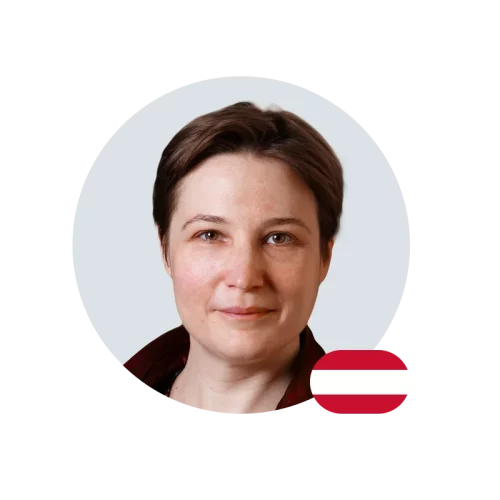
Dr. Sandra Siegert is a trained biologist, having obtained her PhD in Neurobiology at the Friedrich Miescher Institute in Basel, CH, and performed her postdoctoral work at MIT. In 2015, joined the Institute of Science and Technology Austria (ISTA) as an independent Assistant Professor with an ERC starting grant focusing on the interaction of microglia with neurons. She received tenure in 2023, and from July 2025 onwards will oversee the ISTA Life Science Faculty as Area Chair. Dr. Siegert combines various techniques to study the interplay between neurons and microglia. Throughout her career, she has been involved in innovative technology development, resulting in patent applications. Her most recent discovery of 60-Hz reducing perineuronal nets, which lock the brain in a functional state, opens the possibility of a noninvasive light therapy treatment for mental health challenges. As an ERC PoC awardee, she co-founded the start-up Syntropic Medical GmbH in 2022.

Ryszard Wielowski is currently a PhD candidate at the Doctoral School of the AGH University of Science and Technology in Kraków, Poland, where he conducts research in the field of carbon composites. He obtained his MSc degree in Chemical Technology from the same institution, graduating with distinction.
His research focuses on the development of carbon-based composites for biomedical and electrochemical applications, with particular emphasis on their potential use in contact with neural tissue. He specializes in the synthesis and characterization of carbon nanomaterials, especially carbon nanotubes, as well as the study of low- and medium-textured pyrolytic carbon.
He is a co-author of seven peer-reviewed articles published in Impact Factor journals and has presented his work at more than a dozen national and international scientific conferences

Janka Matrai is a scientific officer at the ERCEA – The Executive Agency of the European Research Council (ERC), in the Life Sciences Unit. She is responsible for the whole life cycle of grant application, evaluation and follow-up processes in two panels, Integrative Biology: From Genes and Genomes to Systems, and Neuroscience and Disorders of the Nervous System. She is also involved in the widening participation campaign, which aims to close the gap between the widening participation countries and the rest of the EU. Prior to this, she worked as a scientific project officer at the Joint Research Centre – Institute for Reference Materials and Measurements in the Standards for Innovation and Sustainable Development, Reference Materials for Biotechnology and Life Sciences Unit.
After graduating from the Budapest University of Technology and Economics as a bioengineer, Janka obtained her PhD degree in Biochemistry and Bioinformatics at the Catholic University of Leuven (KUL), after which she continued with scientific research as a postdoctoral scientist in areas of Molecular Modelling and Drug Design, and Fundamental and Translational Medical Research, Gene Therapy and Regenerative Medicine at the Flanders Institute for Biotechnology (VIB) and the Free University of Brussels (VUB).
She is a member of the Association for Glycogen Storage Disease UK, and cofounder of the Belgian Club of Hungarian Scientists.

Piotr Majka is an assistant professor at the Laboratory of Neuroinformatics at the Nencki Institute of Experimental Biology in Warsaw. His research investigates how the intricate microscopic structure of the brain’s connectivity network translates into perception, behavior, and specific actions by integrating computational neuroanatomy, multiscale data analysis, high-throughput imaging, classical neuroanatomy, and neurophysiology. With over 15 years of experience, Dr. hab. Majka has developed multimodal 3D brain atlases, advanced multimodal image registration techniques, and neuroinformatics platforms. His interdisciplinary work has resulted in the most comprehensive cortico-cortical connectome of any non-human primate brain to date. These contributions earned him recognition from the Polish Prime Minister for outstanding scientific achievements in 2024.

Włodzislaw Duch is the head of the Neurocognitive Laboratory in the Center of Modern Interdisciplinary Technologies, and the Neuroinformatics and Artificial Intelligence group in the University Centre of Excellence Dynamics, Mathematical Analysis and Artificial Intelligence at the Nicolaus Copernicus University, Toruń, Poland. PhD in theoretical physics/quantum chemistry (1980), postdoc at the Univ. of Southern California, Los Angeles (1980-82), D.Sc. in applied math (1987). President of the European Neural Networks Society executive committee (2006-2008-2011), Fellow of the International Neural Network Society (2013), Asia-Pacific Artificial Intelligence Association (2022), and the International Artificial Intelligence Industry Alliance (2024). Expert of the European Union science programs, member of the high-level expert group of European Institute of Innovation & Technology (EIT). Worked in the School of Computer Engineering, Nanyang Technological University (2003-07, 2010-12 as the Nanyang Visiting Professor). Visiting professor at the University of Florida; Max-Planck-Institute, Munich, Germany, Kyushu Institute of Technology, Meiji and Rikkyo University in Japan, and several other institutions. He is/was on the editorial board of IEEE TNN, CPC, NIP-LR, Cognitive Neurodynamics, Journal of Mind and Behavior, and 16 other journals; published over 380 peer-reviewed scientific papers, has written or co-authored 6 books and co-edited 21 books, and published about 300 conference abstracts and popular articles on diverse subjects. In 2014-15 he served as a deputy minister for science and higher education in Poland. His DuchSoft company has made in 1990 the GhostMiner data mining software package, for many years marketed by Fujitsu. With a wide background in many branches of science and understanding of different cultures he bridges many scientific communities. To unwind he plays electronic wind instruments and dives with whale sharks.
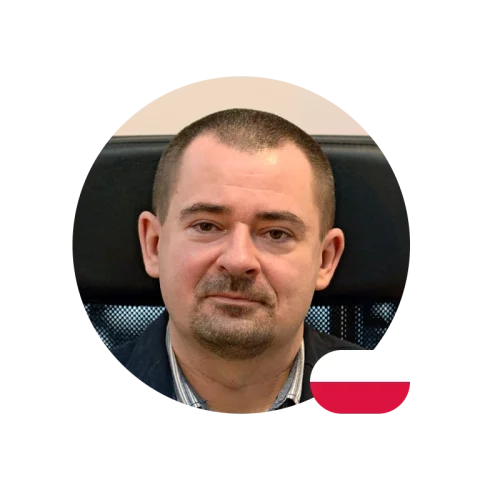
Daniel Wójcik is a physicist by training. He worked on the interface of classical and quantum chaos and statistical physics. In 2003, after two postdocs in physics (University of Maryland, College Park and Georgia Institute of Technology), he moved to the Nencki Institute of Experimental Biology, Polish Academy of Science where he started work in neuroscience. He is currently a professor of neuroscience and the head of the Laboratory of Neuroinformatics at Nencki. He was the Head of the PhD Studies at the Nencki Institute for a decade and the first Chair of the Programme Board of the Warsaw PhD School in Natural and BioMedical Sciences. He is a member of the Pan-Europe Regional Committee of the International Brain Research Organization (IBRO-PERC) and a member of the FENS-CHET committee by nomination from IBRO-PERC. He was the Polish Representative at the International INCF Governing Board (2007-2015); the Governing Board Member and Treasurer of the Polish Society for Neuroscience (2011-2015); a Member of the Polish Academy of Sciences Neurobiology Committee (since 2011, Deputy Chair since 2020) and the Director of the Organization for Computational Neuroscience (2015-2017). His main interests are modeling and analysis of electrophysiological data, especially field potentials and current source density reconstruction.

Chaitanya Chintaluri is a computational neuroscientist and theoretical biologist specializing in the metabolic control of neural function. He earned his PhD from the Nencki Institute of Experimental Biology in Poland, where he studied the propagation of currents in brain tissue. Since 2017, he joined Prof. Vogels’s group as a post-doctoral researcher at the University of Oxford and moved to the Institute of Science and Technology Austria in 2020. Chaitanya is interested in the post-translational modifications of ion channels, neuronal metabolism, and excitability.

Solveiga Samulėnaitė is a PhD candidate in a joint doctoral program between Pompeu Fabra University in Spain and Vilnius University in Lithuania. Her research is primarily conducted at the Neuropharmacology Laboratory at Pompeu Fabra University, a center known for its work on the neurobiology of addictions, and the Department of Biological Models at Vilnius University.
Her doctoral work examines the relationship between the gut microbiota and brain function in the context of food addiction, aiming to identify novel pathways involved in reward-related behaviors and searching for potential preventive or treatment strategies for food addiction and related eating disorders.
Solveiga is the first author of a high-impact, peer-reviewed publication in Gut, which was recognized as the Top Paper of Gut 2024, and she was personally acknowledged as the Top Author of Gut 2024. Her scientific contribution was further honored with the Excellence Award at the 37th Congress of the European College of Neuropsychopharmacology (ECNP). Solveiga has actively contributed to the scientific community by presenting her work at numerous national and international conferences, and she remains deeply engaged in interdisciplinary and collaborative academic initiatives.

Sandra Zarychta received her M.S. degree in Automatic Control and Robotics from the Lodz University of Technology, Lodz, Poland, in 2020. She researched developing an extended-range endoscope for diagnosing and treating the entire digestive system during her studies. Her M.S. thesis earned two prestigious awards. In 2020, she also received a scientific grant from the National Science Centre, Poland.
She is pursuing a Ph.D. in Mechanical Engineering at the Lodz University of Technology. Her research, „Numerical and Experimental Investigation of a Discontinuous Capsule Drive with the Use of Fourier Series-Based Method of Control Optimization,” earned her the Young Researcher Award for Best Poster Presentation at Dynamics Days Europe 2023.
As of 2024, Sandra is a researcher at the Center for Digital Medicine and Robotics, Jagiellonian University Medical College in Krakow, Poland, where she is involved in the European project Erasmus+ “iTeam – Interactive Teaching of Medical 3D Cardiac Anatomy Supported by Mixed Reality.”
In addition to her role at Jagiellonian University, she is engaged in research related to segmentation and visualization tools based on medical imaging, specifically „3D Pancreatic Imaging, and Segmentation for Preoperative Precision and Visualization,” at the 3D Functional and Virtual Medical Imaging Laboratory, Department of Diagnostic Imaging, University Hospital in Krakow.
Sandra’s current research interests include 3D medical modeling, biomedical engineering, and medical robotics, focusing on leveraging advanced medical technologies.

Dr. Justyna Zmorzyńska is a neuroscientist whose work bridges molecular genetics, neurodevelopmental biology, and translational neuroscience. Her work is driven by a deep interest in understanding how genetic and cellular mechanisms shape the developing brain, with a particular focus on neurodevelopmental disorders such as autism spectrum disorders, intellectual disability, and anxiety. She currently leads the Laboratory of Developmental Neurobiology at the International Institute of Molecular Mechanisms and Machines (IMol PAS), where she combines cutting-edge techniques with a translational mindset. Dr. Zmorzyńska earned her PhD from the Department of Genetics at the University Medical Center Groningen in the Netherlands, and continued her training as a postdoctoral fellow and later senior researcher at the International Institute of Molecular and Cell Biology (IIMCB) in Warsaw. Her scientific journey has also included research stays in leading international labs, including those of Prof. Didier Stainier at the Max Planck Institute for Heart and Lung Research in Germany, and Prof. William Harris at the University of Cambridge. Her scientific leadership has been recognized through multiple prestigious research grants, including the SONATA BIS award from the Polish National Science Center and, most recently, the First Team grant from the Foundation for Polish Science.

Magdalena Chadzińska, PhD, is a professor at the Faculty of Biology, Jagiellonian University in Kraków, Poland. She works at the Department of Evolutionary Immunology at the Institute of Zoology and Biomedical Research and her scientific interests focus on the evolution of neuroendocrine-immune interaction, including the role of the immune system in adaptation to environmental stressors.
A significant part of her research involves the zebrafish (Danio rerio) model, which she uses to investigate inflammation, immune responses, and host-pathogen interactions. Her recent work includes studies on the oral pathogen infections and their role in the induction of neuroinflammation and neurodegeneration.
Prof. Chadzińska has authored numerous peer-reviewed publications and actively participates in national and international research initiatives. She is committed to fostering interdisciplinary collaboration and mentoring early-career scientists.

Wawrzyniec L. Dobrucki, Ph.D.
Associate Professor of Bioengineering and Medicine
Health Innovation Professor, Carle-Illinois College of Medicine
Associate Head for Graduate Programs, Department of Bioengineering
Affiliations:
Department of Bioengineering
Department of Biomedical and Translational Sciences
Beckman Institute for Advanced Science and Technology
University of Illinois at Urbana-Champaign
Wawrzyniec L. Dobrucki is Associate Professor and Associate Head for Graduate Programs in the Department of Bioengineering at the University of Illinois at Urbana-Champaign. He also holds a faculty appointment at the Beckman Institute for Advanced Science and Technology, where he directs the Experimental Molecular Imaging Laboratory (EMIL). His research focuses on preclinical molecular imaging and the development of targeted, multimodal strategies to assess tissue microenvironments and biological processes in vivo, such as neovascularization, atherosclerosis, tumor progression, and treatment response.
With over 20 years of experience, Prof. Dobrucki has advanced translational bioimaging through innovations in SPECT/PET radiotracers and multifunctional contrast agents. He co-founded two biomedical startups and serves as a scientific consultant to the Biobanking and Biomolecular Resources Research Infrastructure of Poland.
He earned his Ph.D. in chemistry from Ohio University and his M.Sc. in bioengineering from the Technical University of Wroclaw, Poland, and the Technical University of Hamburg, Germany.

Patrycja is a biomedical engineer and biomaterial scientist working at the Department of Biomaterials and Composites, Faculty of Materials Science and Ceramics at AGH University of Krakow. She specializes in developing functionalized hydrogels for advanced medical applications, including regenerative medicine and theranostics. Over her 10+ years of research experience, Patrycja has explored composite biomaterials for osteochondral repair, multifunctional materials for biodegradable intramedullary nails, and polymeric and composite coatings for magnesium-based implants. Her international background includes research stays at the New Jersey Center for Biomaterials, Rutgers University, USA, and the University of Duisburg-Essen, Germany. Patrycja is actively involved in the scientific community, serving on the Board of the Young Scientist Forum of the European Society for Biomaterials and the Polish Society for Biomaterials. She is also an Assistant Editor for the Engineering of Biomaterials journal.

Agnieszka Jaźwa-Kusior, PhD, DSc
Dr. Agnieszka Jaźwa-Kusior graduated from the Faculty of Pharmacy with the Medical Analytics Division at the Jagiellonian University Medical College. In 2008 she obtained her PhD from Jagiellonian University, investigating the proangiogenic gene therapies in ischemic vascular diseases under professor Józef Dulak’s supervision. Then, as a post-doc, she joined professor Antonio Cuadrado’s lab at Autonomous University of Madrid studying molecular mechanisms of Parkinson’s disease.
Upon return to Poland, she carried out her research on ischemic cardiovascular diseases at the Faculty of Biochemistry, Biophysics and Biotechnology at the Jagiellonian University under grants awarded by the Foundation for Polish Science (FNP), the Ministry of Science and Higher Education (MNiSW) and the National Science Centre (NCN).
The current research interests of Dr. Agnieszka Jaźwa-Kusior focus on cellular and molecular mechanisms of cardiovascular diseases. She is applying proteomic and transcriptomic big data analysis to identify novel biomarkers of cellular senescence and uncover potential therapeutic targets involved in endothelial dysfunction and vascular aging.
Up to date Dr. Agnieszka Jaźwa-Kusior has published over 40 papers in peer-reviewed international journals. She is a member of the evaluation committees and reviewer of various granting programs, as well as ad hoc reviewer for international journals in the fields of redox and cell biology, gene therapy and cardiovascular disorders.

Iga Wasilewska is a postdoctoral researcher at the Mossakowski Medical Research Centre, Polish Academy of Sciences in Warsaw. Her work focuses on fundamental aspects of calcium signaling and mitochondrial biology, using zebrafish as a model organism. She currently leads a SONATINA 5 project investigating the role of TMBIM5 in mitochondrial Ca2+ regulation. Her work combines molecular biology, behavioral phenotyping, microscopy, and in vivo imaging techniques.
She received her PhD in medical sciences (specializing in medical biology) from the Medical University of Warsaw, conducting her doctoral research at the International Institute of Molecular and Cell Biology in the Laboratory of Neurodegeneration. Her thesis explored the function of STIM2 in neuronal calcium homeostasis and behavior in zebrafish, resulting in several first-author publications. Iga Wasilewska holds BSc and MSc degrees in Neurobiology from the Jagiellonian University in Kraków.
Her scientific interests center on calcium-dependent signaling pathways, mitochondrial function, and the use of zebrafish to study cellular physiology in vivo. She has completed short-term scientific stays at institutions including Saarland University and the University Medical Center in Mainz.
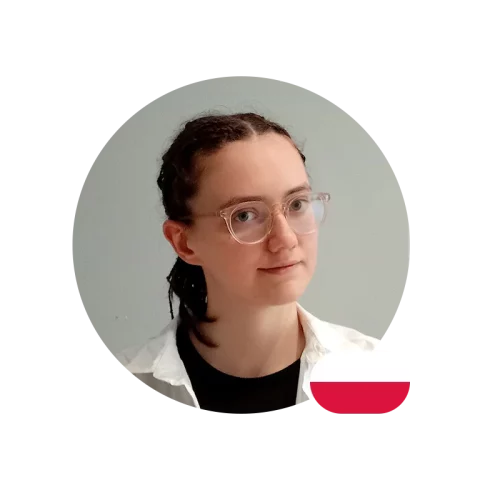
Patrycja Kwiek holds a Bachelor’s degree (2021) and a Master’s degree (2022) in Biomedical Engineering from AGH University of Krakow. Her early research focused on modeling the spread of COVID-19 and developing image processing techniques for detecting small objects in MR brain scans. Currently pursuing a PhD at the same institution, she concentrates on color-based object recognition using machine learning and deep learning. Her work explores the influence of color space models on biomedical image interpretation and includes the generation of synthetic biomedical data using Mixture-of-Experts GANs and diffusion models. Patrycja has also designed neural architectures, such as Attention U-Net, for applications like retinal vessel segmentation. In addition to her research, she teaches machine learning and data analysis across various engineering programs.

Prof. Joanna Monika Wierońska is curently a Head of the Laboratory of Neurobiology of Psychiatry Disorders.She been working at Maj Institute of Pharmacology Polish Academy of Sciences since 1997, initially in the Department of Pharmacology and then until now in the Department of Neurobiology.
Most of her scientific work has been focused on the activity of metabotropic receptor ligands in animal models of psychiatric disorders. The most interesting achievements of her recent work include:
- demonstration that positive allosteric modulators of mGlu4 receptor exert efficacy against the amnestic effect of MK-801 in animal models of schizophrenia and that the effect was dependent on the 5-HT1A receptor;
- demonstration that simultaneous administration of the subthreshold doses of the ligands of metabotropic glutamate receptors (mGlu2 or mGlu4) with muscarinic receptors (M1, M4, and M5), induced an antipsychotic effect similar to that observed after administration of active doses of each compound alone; the activity of the combined administration was evident especially in MK-801 based deficits in learning and memory;
- demonstration that the negative allosteric modulators of mGlu7 receptors exert activity in animal models of schizophrenia, including efficacy against amnestic effect of MK-801;
- demonstration that the administration of mGlu2 or mGlu5 activators may affect eNOS expression in MK-801 or scopolamine-induced models of cognitive decline; the compounds were shown to balance L-arginine derivatives in the brain.
She is a member of the Polish Society of Pharmacology and the National Ethic Committee for Animal Research. She is also conducting two research grants concerning the mechanisms by which metabotropic glutamate receptor ligands could reverse cognitive impairments associated with various pathologies.
Dr hab. Joanna Monika Wierońska prof. IF PAN
Department of Neurobiology, Laboratory of Neurobiology of Psychiatric Disorders
Maj Institute of Pharmacology Polish Academy of Sciences
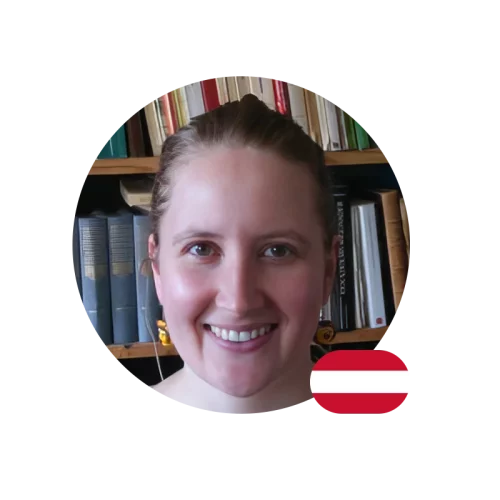
Ilse Krätschmer is currently a postdoc at the Institute of Science and Technology Austria (ISTA). There, she is developing statistical models to better understand highly correlated and high dimensional omic data and their influence on human phenotypes. Her scientific career began in experimental particle physics at the Institute of High Energy Physics (HEPHY) in Vienna. She was a member of the CMS collaboration at the Large Hadron Collider (LHC) at CERN for eight years and held several positions of responsibilities with the CMS collaboration. From 2018 to 2019, she was also the chair of the section for nuclear and particle physics (FAKT) of the Austrian Physical Society (ÖPG), representing the interests of nuclear and particle physics within the ÖPG.
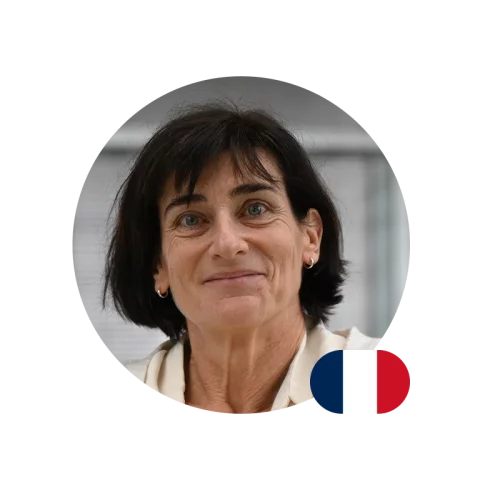
Dr. Muriel Koehl is a senior researcher at the French National Centre for Scientific Research (CNRS) working at the Neurocentre Magendie (INSERM U1215) in Bordeaux. She holds a PhD in Neuroscience and Pharmacology from Bordeaux 2 University (1998), an “Agrégation” in Biochemistry and Biological Engineering from ENS Cachan (1994), and a Bachelor’s degree in Biochemistry from Paris 7 University (1993).
Dr. Koehl’s research focuses on the behavioral and neurobiological consequences of early life adversity, using rodent models to explore how prenatal stress, deficient maternal care, and other early traumas influence brain development. Her primary interest lies in the hippocampus, investigating how its development, function, and connectivity are affected by early environmental challenges. She is particularly interested in the role of adult neurogenesis in mediating the long-term impact of early life stress, with the goal of identifying new targets for preventing and treating neurodevelopmentally-induced psychopathologies such as depression, PTSD, and anxiety disorders.
Dr. Koehl has authored more than 60 scientific publications, with an h-index of 32 and over 5,600 citations.

Research interests of Dr. Maciej Wielgosz are within Artificial Intelligence, Reinforcement Learning, Medical imaging and Embedded Machine Learning. He completed his M.Sc. from the Faculty of Electrical Engineering, Automatics, Computer Science, and Electronics at the AGH University of Science and Technology in 2005. He continued his studies at the same institution, obtaining his Ph.D. from the Department of Electronics in 2010 with honors. He was awarded the Habilitation Degree in 2021 in the discipline of information and communication technology for his thematically related cycle of scientific articles titled „Design of low-latency architectures for machine learning algorithms.” Over the years, Dr. Wielgosz has held positions in various research institutions. He has been associated with the NIBIO Norwegian Institute of Bioeconomy Research since September 2022 as a Machine Learning Researcher, where he focuses on ML solutions for Point Cloud, 3D data, and images in Forestry. Prior to that, he worked at the Centre de Visió per Computador (CVC) at Universitat Autònoma de Barcelona, focusing on „Adversarial Cases for Autonomous Vehicles (ARCANE).” Furthermore, since 2010, he has been an Assistant Professor at the AGH University of Science and Technology. Dr. Wielgosz’s expertise has also been sought by international organizations such as the European Organization for Nuclear Research (CERN), where he worked on detecting anomalous behavior of LHC superconducting magnets. He has also collaborated with Cadence Design Systems, NTNU University of Science and Technology, and the Department of Telematics in Trondheim, Norway.
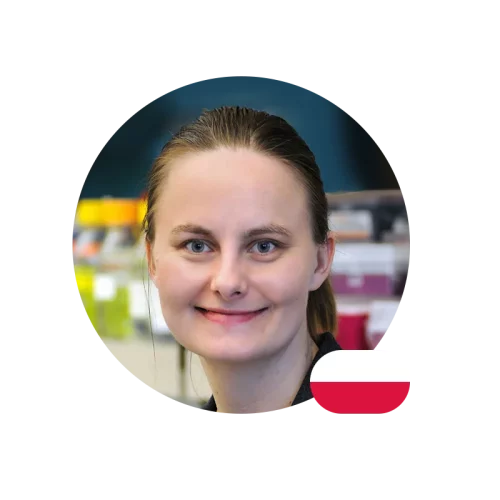
Małgorzata Borowiak is a researcher and professor at Adam Mickiewicz University (UAM) in Poznań, Department of Gene Expression within the Institute of Molecular Biology and Biotechnology.
Her research focuses on the regeneration of organs, particularly the liver and pancreas. She is actively involved in projects on developing pancreatic cells that produce insulin in the laboratory, aiming to find new approaches for treating diabetes by making transplant procedures independent of donor availability. Her work utilizes advanced techniques such as single-cell sequencing, gene modification, human pluripotent stem cell differentiation, metabolomics, and the development of bioinformatic methods. Her work was published in Nature, Cell Stem Cell, Nature Biotechnology, Science Advances, Nature Communications, Diabetes, and the Journal of Clinical Investigation (JCI).
Prior to her work at UAM, Professor Borowiak gained extensive experience abroad. She completed her MSc degree with distinction from Adam Mickiewicz University. She pursued her PhD studies at the Max-Delbrück Center for Molecular Medicine with Prof. Carmen Birchmeier, earning her PhD with honors from the Free University of Berlin. After completing her doctoral studies, she moved to Harvard University in Cambridge, MA, USA, for postdoctoral research, where she worked with Professor Doug Melton on the application of human pluripotent stem cells and chemical biology in regenerative medicine, supported by a Howard Hughes Medical Institute (HHMI) fellowship. She then established her research group as a Tenure-Track Assistant Professor and McNair Scholar in Medicine at Baylor College of Medicine in Houston, Texas, where she led a research program on pancreatic cell fate determination and the molecular basis of atypical diabetes.
Professor Borowiak holds three patents licensed to biotech companies. Her research is supported by substantial funding from various sources, including the National Institutes of Health (NIH), the Juvenile Diabetes Research Foundation (JDRF), the European Union’s Horizon 2020 (Marie Skłodowska-Curie actions), the McNair Medical Institute, the Helmsley Foundation, the Foundation for Polish Science, and the Polish National Science Centre. Her achievements have been recognized with numerous accolades, including being a McNair Institute Gold Scholar, Helmholtz Junior Group Leader funding, and an award from the Polish Academy of Arts and Sciences (PAU).

Jakub Kwieciński, PhD, is a Team Leader at the Department of Microbiology; Faculty of Biochemistry, Biophysics and Biotechnology; Jagiellonian University in Krakow, Poland.
His research lies at the intersection of microbiology and immunology, with a focus on understanding of host-pathogen interactions and application of this knowledge to infection treatment. He is particularly interested in the leading human pathogen Staphylococcus aureus, and emerging animal pathogens of the Prototheca genus.
Dr. Kwiecinski earned his PhD from the University of Gothenburg, and conducted postdoctoral research at the University of Chicago, the University of Iowa, and the University of Colorado. In 2021, he returned to Poland to establish his independent group, supported by the Foundation for Polish Science, the Polish National Science Centre, and the Morris Animal Foundation.

Dr Roman Major is the head of the Surface Engineering and Biomaterials Laboratory as well as the Laser and Acoustic Scanning Microscopy Laboratory at the Institute of Metallurgy and Materials Science of the Polish Academy of Sciences in Kraków.
His research focuses on the impact of advanced surface engineering techniques on the properties of materials, primarily intended for components of cardiovascular system regeneration systems. In particular, his work addresses the fabrication and diagnostics of coatings deposited using advanced physical methods, including laser ablation.
His studies integrate issues at the intersection of materials engineering (biomaterials engineering), molecular biology, and regenerative medicine. He employs tools from molecular biology to design and test materials, and, based on anatomical analysis of natural organs, he undertakes attempts to replicate their structures using various types of biomaterials.
He is the author or co-author of 300 scientific publications, including 242 papers published in journals listed in the Journal Citation Reports (JCR).

Dr Krzysztof Szyszkiewicz-Warzecha holds a research and teaching position at the AGH University of Science and Technology in Kraków. He has an academic background in applied mathematics, with a specialization in partial differential equations, as well as in electrochemistry (PhD). His current research interests focus on computational methods and mathematical modeling in the fields of rebar corrosion in reinforced concrete, ion-selective electrodes, electrochemical impedance spectroscopy, and lithium-ion cell modeling. He is the co-author of 45 scientific publications and a university textbook on mathematical and numerical methods applied in materials science.

Dominik Grochala received his PhD in a field of Biomedical Engineering and Biocybernetics. His theses was related to electronic solutions for bioacoustic applications. As a second field of study he graduated in materials engineering, which complements the interdisciplinary education. His current interests are associate with dedicated measurement systems for biomedical applications. The subject of his doctoral thesis was development of dry electrodes for biopotential measurements, based on CNT composite. Additionally he is involved in research projects in cooperation with a Medical College related to bioacoustic diagnostics methods. His experience and skills in the field of medical equipment maintenance and clinical engineering were developed during internships.

Ali Jawaid, MD, PhD is a physician-scientist with training in both clinical and basic neuroscience. He is a Principal Research Investigator at the Research Network Łukasiewicz – PORT Polish Center for Technology Development in Wroclaw, Poland. He completed his medical studies at Aga Khan University, Karachi, Pakistan, and followed it up with a fellowship in Neuropsychiatry at Baylor College of Medicine, Houston, TX, USA. He then completed an MD-PhD in Neuroscience from Switzerland (simultaneous PhD degrees awarded by the UZH/ETH International Program in Neuroscience and the UZH MD-PhD program in 2016). Dr. Jawaid has worked extensively in the fields of childhood trauma, memory, neurodegenerative disorders, neuroepigenetics, and epigenetic inheritance. He has authored 75+ publications in notable scientific journals such as Nature, Science, Nature Neuroscience, Nature Human Behavior, Neuron, Nature Communications, Trends in Genetics, EMBO Journal, and Molecular Neurodegeneration, and has a current H-index of 31. He is currently a scholar of the FENS-Kavli Network of Excellence—a platform of 30 leading neuroscientists in Europe.

Anna Solarz-Andrzejewska, PhD is a postdoctoral researcher at the Laboratory of Molecular Biology, Institute of Physiotherapy and Health Sciences, Academy of Physical Education in Katowice, Poland, where she works on project examining the role of physical activity in enhancing brain resilience to chronic stress, with a focus on the blood-brain barrier. She earned her doctoral degree in 2024 at the Jerzy Maj Institute of Pharmacology, Polish Academy of Sciences, where her research addressed the role of the blood-brain barrier, inflammation, and endoplasmic reticulum stress in responses to early-life stress. As a laureate of the Preludium, National Science Center Poland grant, she investigated how early-life stress affects BBB functioning and neuroinflammatory processes during brain development, emphasizing sex differences. Her scientific interests include stress-related brain plasticity, mood disorders, and neurodevelopmental vulnerability. She has completed several international research stays and training programs, including at Karolinska Institutet and the CAJAL Advanced Neuroscience Training Programme.

Jan Kamiński, PhD, is Head of the Laboratory of Neurophysiology of Mind at the Nencki Institute of Experimental Biology, Polish Academy of Sciences (PAS). His laboratory focuses on innovative methodologies involving single-neuron recordings in Humans and the application of machine learning techniques to large-scale electrophysiological data.
He earned his PhD in Neuroscience from the Nencki Institute in 2012. He then completed postdoctoral fellowships at Cedars-Sinai Medical Center and at the California Institute of Technology.
In 2007, he was recognized as the best student at SWPS University in the Primus Inter Pares contest. He received the EBBS-Rhodes Young Investigator Award in 2009 and START scholarships from the Foundation for Polish Science in both 2011 and 2012.
He is the author or co-author of research published in Nature, Nature Neuroscience, and Neuron.

Kinga Gawel, Phd, DSc, MBA is employed at the position of the associate professor at the Department of Experimental and Clinical Pharmacology, Medical University of Lublin, Poland. She completed her post-doc at the Centre for Molecular Medicine Norway, University of Oslo, Norway, funded by Polish Ministry of Science and Higher Education (Mobilnosc Plus V program) and a Marie Curie Individual Fellowship. At the time, she was trained in epilepsy research using zebrafish as a model organism. Following this, she spent several months in the laboratory of Professor H. Steve White, at the University of Washington, USA within Fulbright Senior Award, funded by Polish-US Fulbright Commission. She is a reviewer for many different institutions, mainly abroad (France, Czech Republic, EU, Fulbright) and the member of the Committee on Physiological and Pharmacological Sciences of the Polish Academy of Sciences 2024-2027. In her scientific work she focuses on understanding the mechanisms underlying epilepsy (pathophysiology) and discovering new drug leads useful in epilepsy management.

Jan K. Argasiński, PhD is an Assistant Professor at the Faculty of Physics, Astronomy and Applied Computer Science of the Jagiellonian University in Kraków, Poland. He holds a PhD in the arts and serves as the Head of the Computational Neuroscience Research Group at Sano – Centre for Computational Personalised Medicine, an International Research Foundation.
His interdisciplinary research spans computational neurobiology and biologically inspired artificial intelligence, with a focus on neuromorphic systems such as Spiking Neural Networks and their medical applications. His additional areas of interest include affective computing and the use of virtual and augmented reality technologies.
Dr. Argasiński has authored and co-authored numerous publications in these fields, including works on serious games, biosignal analysis, affective patterns, and virtual reality as a narrative and artistic medium.

Klaudia Kubiak PhD, is a biomedical scientist specializing in oncology and neurobiology. She obtained her PhD in molecular medicine from the University of Göttingen, where she studied the impact of the H3.3K27M mutation on the function of CBP/p300 and BET family proteins in pediatric gliomas (DIPG). Her research focuses on epigenetic mechanisms in cancer and the investigation of new therapeutic strategies. Currently, she is conducting research on targeted therapies for pancreatic ductal adenocarcinoma (PDAC) and brain tumors, utilizing epigenetic inhibitors, PROTACs, and nanoparticle-based drug delivery systems. The goal of her work is to develop innovative therapeutic strategies that can be applied in cancer treatment, contributing to improved therapy efficacy and the quality of life of oncology patients.

Maciej Ginalski, PhD, has spent over two decades at the intersection of engineering and business, where technical precision meets strategic vision. He holds an MSc and PhD in Computational Fluid Dynamics (CFD), complemented by an MBA from the University of Manchester. His professional background includes roles at Ansys and its leading Polish partner, where he led both technical and commercial teams. Dr. Ginalski is committed to addressing real-world challenges through a combined lens of engineering excellence, long-term strategy, scalability, and business value.